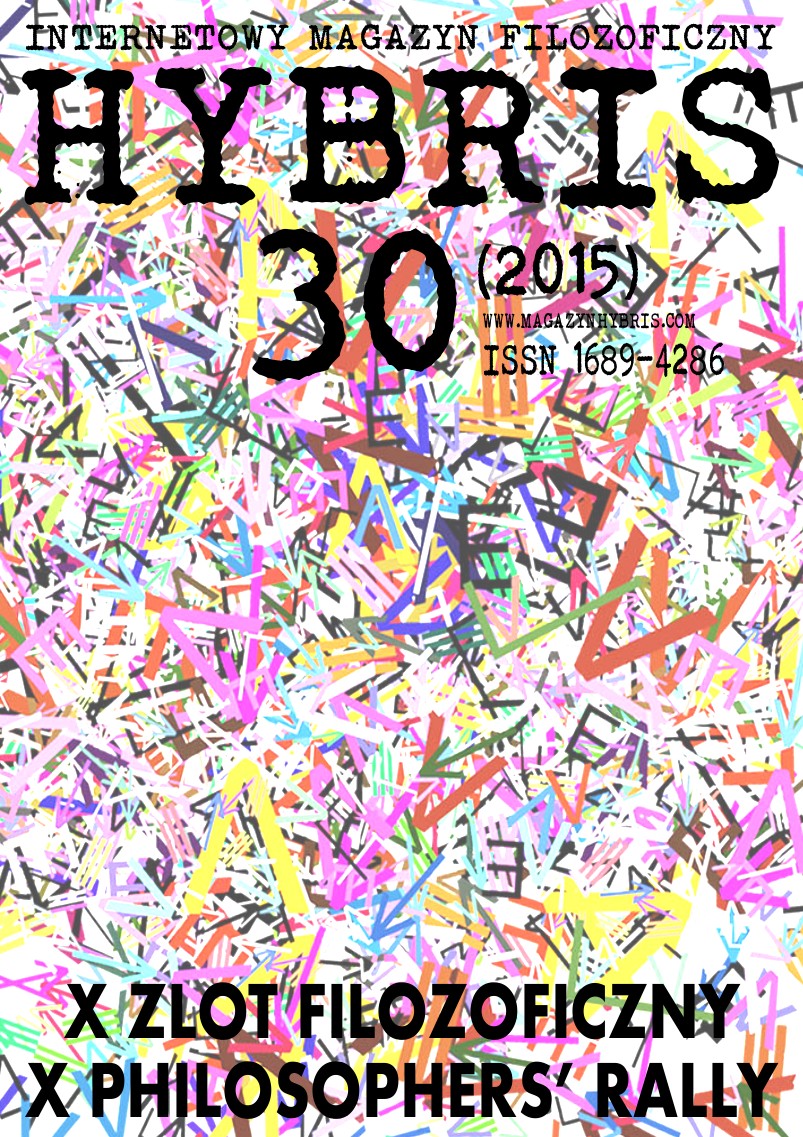Wybrane teorie leżące u podstaw współczesnego paradygmatu wojny
DOI:
https://doi.org/10.18778/1689-4286.30.07Słowa kluczowe:
Clausewitz, war, conflict, paradigm, KuhnAbstrakt
This article will try to indicate the most important theories which constitute the modern paradigm of the war. The theory of the war is an important issue in political philosophy because it accentuates how the boundaries of the existence and the functioning of the state are drawn. Seeking works that form the basis of the paradigm, one should begin with presenting a specific structure of the theory proposed by T. Kuhn. On this basis the article will be divided into three parts.
The first part is focused on the construction of Kuhn’s scientific paradigm. Additionally in order to prove the meaningful use of paradigmatic structure in issues connected to humanities and philosophy Giorgio Agamben thesis will also be presented.
The next part will expose the main elements of Carl von Clausewitz's theory of war. The most important of these is an assumption that war is the continuation of political action that seeks to compel the enemy to fulfill “our will”. The second element to be tested will be a political concept of Carl Schmitt along with its specific categories of the enemy and the friend. The second element to be tested will be Carl Schmitt’s the Concept of the political with its specific categories: the enemy and the friend.
The third part of the paper will present the concept of Jerzy Wiatr. Its task will be to supplement the paradigm by showing that the parties of the war may be a “political community” and not only the state. This will help to extend the applicability of the paradigm in various fields of the social sciences.
The ultimate aim will be to convince the reader that these theories are the most important part of the paradigm. Moreover, there is a high probability that they became the basis for the modern paradigm of the war.
Bibliografia
Agamben, Giorgio, 2002 “What is a Paradigm.” Lecture at European Graduate School [Online] http://www.egs.edu/faculty/giorgio-agamben/articles/what-is-a-paradigm/ dostęp z dnia: 17.07.2014.
Zobacz w Google Scholar
Aron, Raymond, 1995, Pokój i wojna między narodami, Warszawa: Centrum im. Adama Smitha.
Zobacz w Google Scholar
Chmielarz, Piotr, 2010, Wojna a państwo, Warszawa: Scholar.
Zobacz w Google Scholar
Clausewitz, Carl, 2010, O naturze wojny, Warszawa: Jirafa Roja.
Zobacz w Google Scholar
Esposito, Vincent, 1954, War as a Continuation of Politics, Military Affairs, Vol. 18, No. 1 (Spring, 1954), pp. 19–26.
Zobacz w Google Scholar
DOI: https://doi.org/10.2307/1982704
Giddens, Anthony, 1985, The Nation-State and Violence, Cambridge: Polity Press.
Zobacz w Google Scholar
Kaczorowski, Paweł, 1998, My i Oni. Państwo Jako Jedność Polityczna, Filozofia polityczna Carla Schmitta w okresie republiki weimarskiej, Warszawa, Główna Szkoła Handlowa.
Zobacz w Google Scholar
Karolczuk, Edward, 2010, O wrogu. Szkice filozoficzno-historyczne, Warszawa: Instytut Wydawniczy „Książka i Prasa”.
Zobacz w Google Scholar
Keegan, John, 1998, Historia wojen, Warszawa: Książka i Wiedza.
Zobacz w Google Scholar
Koziej, Stanisław, 1993, Teoria sztuk wojennej, Warszawa: Bellona.
Zobacz w Google Scholar
Kuhn, Thomas, 1968, Struktura rewolucji naukowych, Warszawa: PWN.
Zobacz w Google Scholar
Mikusińska, Aldona, 2008, Konflikty współczesnego świata, Warszawa: PWN.
Zobacz w Google Scholar
Münkler, Herfred, 2004, Wojny naszych czasów, Kraków: WAM.
Zobacz w Google Scholar
Roxborough, Ian, 1994, Clausewitz and the Sociology of War, “The British Journal of Sociology”, Vol. 45, No. 4 (Dec., 1994), pp. 619–636.
Zobacz w Google Scholar
DOI: https://doi.org/10.2307/591886
Schmitt, Carl, 2000, Teologia polityczna i inne pisma, Warszawa: Znak.
Zobacz w Google Scholar
Schuurman, Bart, 2010, Clausewitz and the New Wars’ Scholars, “Spring”, ss. 89–100.
Zobacz w Google Scholar
DOI: https://doi.org/10.55540/0031-1723.2515
Toffler, Alvin, Toffler, Heidi, 2006, Wojna i antywojna. Jak przetrwać u progu XXI wieku?, Poznań: Kurpisz S.A.
Zobacz w Google Scholar
Walzer, Michael, 2006, Spór o wojnę, Warszawa: Muza SA.
Zobacz w Google Scholar
Walzer, Michael, 2010, Wojny sprawiedliwe i niesprawiedliwe. Rozważania natury moralnej z uwzględnieniem przykładów historycznych, Warszawa: PWN.
Zobacz w Google Scholar
Weart, Spencer, 2001, Bez wojny. Dlaczego państwa demokratyczne nie walczą ze sobą?, Warszawa: Politeja.
Zobacz w Google Scholar
Wiatr, Jerzy, 1964, Socjologia wojska, Warszawa: Wydawnictwo MON.
Zobacz w Google Scholar
Wright, Quincy, 1964, A Study of War, Chicago: The University of Chicago Press.
Zobacz w Google Scholar
Pobrania
Opublikowane
Jak cytować
Numer
Dział
Licencja

Utwór dostępny jest na licencji Creative Commons Uznanie autorstwa – Użycie niekomercyjne – Bez utworów zależnych 4.0 Międzynarodowe.






